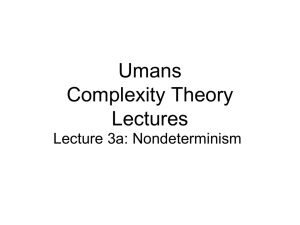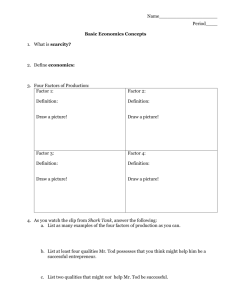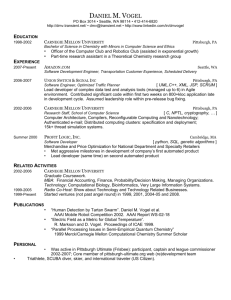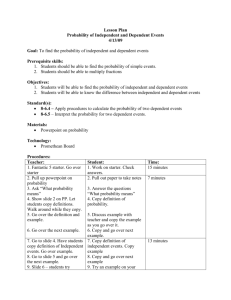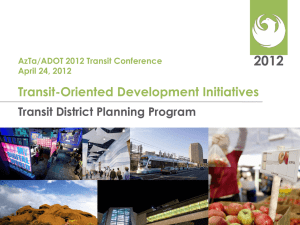Living Realistically with Nondeterminism in Fault-Tolerant, Replicated Applications Joseph Slember Priya Narasimhan
advertisement
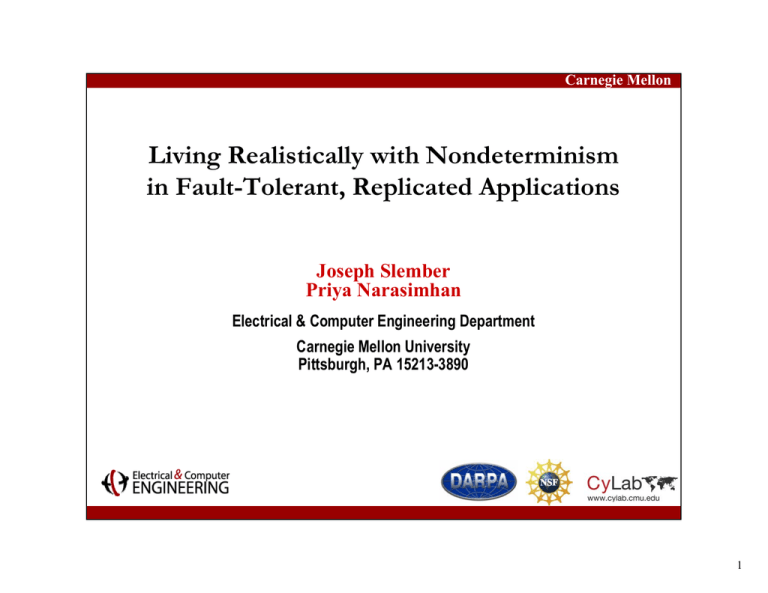
Carnegie Mellon
Living Realistically with Nondeterminism
in Fault-Tolerant, Replicated Applications
Joseph Slember
Priya Narasimhan
Electrical & Computer Engineering Department
Carnegie Mellon University
Pittsburgh, PA 15213-3890
1
Carnegie Mellon
Background & Terminology
Determinism
^
^
Why are fault-tolerant, replicated distributed applications required
to be deterministic?
^
^
Two entities are considered to be deterministic if, when they start from the
same initial state and apply the same sequence of operations, they then
reach the same final state
Should hold even if entities run on completely different machines
Consistent replication is the backbone of fault-tolerance
Determinism results in reproducible state and behavior for a replicated
component/object/process, even if replicas run on different machines
Determinism makes it possible to have consistent replication
2
Joseph Slember
Living Realistically with Nondeterminism
2
Carnegie Mellon
Sources of Nondeterminism
System or environmental Interaction
^
System calls that return host-specific information
^
^
^
Environmental (third-party) interaction
^
^
gettimeofday(), gethostname(), …….
Random number generators
Interaction with human through graphical interface
Interaction with shared memory, I/O, etc.
Scheduling/Control Flow
^
^
Multithreading
Asynchronous Events
^
^
^
Having this kind of
functionality in your
application can cause
problems for
consistent replication
Interrupts
Exceptions
Signals
3
Joseph Slember
Living Realistically with Nondeterminism
3
Carnegie Mellon
The Problem
To achieve consistency, the Fault-Tolerant CORBA (FT-CORBA)
standard requires applications and ORBs to be deterministic
^
“If sources of nondeterminism exist, they must be filtered out.
Multi-threading in the application or the ORB may be restricted, or
transactional abort/rollback mechanisms may be used.”
Effectively forbids the use of local timers, random numbers,
multithreading, shared memory, etc.
End-result
^
^
Real-world applications that contain these kinds of nondeterministic
features cannot be made fault-tolerant!
ORBs are not deterministic according to these rules – thus, the concept of
a fault-tolerant ORB today is not meaningful
How do we get fault-tolerance while living with nondeterminism?
4
Joseph Slember
Living Realistically with Nondeterminism
4
Carnegie Mellon
Existing Options
Fault-Tolerant CORBA standard
^
OS and virtual machine solutions [Bressoud 96/98]
^
Additional scheduler to handle multithreading-induced nondeterminism
Specific replication styles [Barrett 90, Budhiraja 93]
^
Lock-step synchronization of all system calls at the OS or VM levels
Special schedulers [Basile 03, Jimenez-Peris 00, Poledna 00,
Narasimhan 98]
^
Applications must be “born” deterministic or they will not be supported
Passive or semi-active replication with one leader replica forcing its
nondeterministic state-snapshots onto follower replicas
Execution histories [Frolund 00]
^
Uses previous invocations to make nondeterministic correction
5
Joseph Slember
Living Realistically with Nondeterminism
5
Carnegie Mellon
Critique of Existing Options
Current approaches can be categorized as transparent or non-transparent
^
Transparent runtime handling of nondeterminism
^
^
^
^
Transparency is defined w.r.t. the application programmer
Doesn’t change the application source code
Doesn’t involve the application programmer
Forced synchronization or checkpointing at the middleware/VM level
Assumes that anything and everything could be nondeterministic – does not exploit
application-level insight
Non-transparent development-time handling of nondeterminism
^
^
^
^
Changes the application source code – eliminates all instances of potential
nondeterminism from the code
Involves the application programmer
No need to have any additional runtime synchronization or compensation
Eliminates normal forms of application programming, e.g., no multithreading
6
Joseph Slember
Living Realistically with Nondeterminism
6
Carnegie Mellon
Can We Improve Over This?
For the best of both worlds, an ideal technique would involve
^
Runtime transparency assisted by development-time non-transparent insight while
allowing application programmers to use nondeterministic calls and features in code
Why and how would this be beneficial?
^
^
Runtime transparency – will not involve the application programmer at runtime
Development-time non-transparency – will target actual nondeterminism
^
^
^
Will not target potential nondeterminism that might never turn into a consistency problem
Allow application programmers the freedom to use current practices
Not exclusive to one source of nondeterminism – target all forms
Our interdisciplinary approach – program analysis meets fault-tolerance
^
Exploit program analysis at development time
^
^
Control flow, data flow, set-check-use methodology, code generation
Exploit transparent fault-tolerance infrastructure at runtime
^
Replication, total order, fault detection
7
Joseph Slember
Living Realistically with Nondeterminism
7
Carnegie Mellon
Objectives of Our Approach
Allow application programmers to continue to program as before
^
Categorize the different forms of nondeterminism that can be present in
distributed applications
^
Do not need to forbid the use of nondeterministic features, e.g., multithreading
Identify solutions for each category of nondeterminism and understand the
cost/benefit associated with each solution
Targeted compensation for nondeterminism at the application level
^
^
^
Automatically compensating for all nondeterminism can result in significantly
increased overhead
Execution of a nondeterministic call does not automatically imply the need for
compensation
Need application-level insights to determine usage and effect on system state
8
Joseph Slember
Living Realistically with Nondeterminism
8
Carnegie Mellon
Program Analysis Meets Nondeterminism
Take substantially proven compiler techniques and adapt them to the
identification of nondeterminism
At compile time
^
Targeted compensation – Only correct nondeterminism when it occurs
^
Actual vs. perceived nondeterminism (next slide)
Comprehensive compensation – Address all forms of nondeterminism
^
Analyze source code to create compensation code in the event of nondeterminism
Ability to identify all nondeterminism that is known as well as future nondeterminism
that may be introduced due to emerging programming techniques
Deliberately not transparent
^
^
^
Requires source code…..but the process can be automated
No need to rewrite application from scratch
Can be applied to COTS software
9
Joseph Slember
Living Realistically with Nondeterminism
9
Carnegie Mellon
Perceived vs. Actual Nondeterminism
Actual: If GTOD is stored in a variable that is then used later, the
value of GTOD has an impact on the future “slice” of the client
XX=GTOD();
=GTOD();
if(x
if(x>y)
>y)
{…….}
{…….}
gettimeofday()
time
GTOD()
GTOD()
{{
return
returntime
time
}}
Perceived: Value that holds nondeterministic information is never
used
XX=GTOD();
=GTOD();
No
Nouse
useofofXX
gettimeofday()
time
GTOD()
GTOD()
{{
return
returntime
time
}}
10
Joseph Slember
Living Realistically with Nondeterminism
10
Carnegie Mellon
Multithreaded Nondeterminism (Actual vs. Perceived)
T1
T2
Independent Threads
T1
T2
Perceived Nondeterminism
Use of Shared Variable X
Joseph Slember
T1
T2
Actual Nondeterminism
Modification of Shared Variable X
11
Living Realistically with Nondeterminism
11
Carnegie Mellon
Assumptions
Access to application source code to perform program analysis
Runtime compensation requires underlying fault-tolerance
infrastructure with specific guarantees
^
^
^
Reliable, totally ordered delivery of messages
Checkpointing for the consistent retrieval and assignment of application
state
We’re using the MEAD system (http://www.ece.cmu.edu/~mead), but any
system with similar guarantees will work
Previous Assumption:
^
CORBA implementation (i.e., ORB) and operating system are
deterministic
Currently: We have extended our approach to perform program analysis on
TinyOS as well as the MICO ORB to compensate for the ND they contain.
12
Joseph Slember
Living Realistically with Nondeterminism
12
Carnegie Mellon
Development-Time Preparation Phase
Automatic identification of nondeterminism
Automatic creation and insertion of compensation snippets
Program analysis to extract application-specific information and
dependencies
Discovers the actual usage (and impact on state) of
nondeterministic calls
Control-flow analysis, data-flow analysis, set-check-use
methodology
Program analysis to insert checks for consistency across
invocations and compensation, if inconsistency is determined
Can involve the application programmer at development time
(indirect benefit: programmer education in fault-tolerance issues)
13
Joseph Slember
Living Realistically with Nondeterminism
13
Carnegie Mellon
Two Distinct Analyses
System/Environmental Interaction
^
^
^
Scheduling/Control Flow
^
^
^
Track all function and system calls
Track state that passes through these calls
Store nondeterministic state information at runtime
Track all launches of threads
Determine all possible thread interweaving
Store nondeterministic information as threads execute
Both of these solutions are implemented
14
Joseph Slember
Living Realistically with Nondeterminism
14
Carnegie Mellon
Runtime Compensation Phase
Checking conditional to see if state is inconsistent
Piggybacking of sufficient nondeterministic information and
compensation information
Execution of compensation snippets
Saving of local nondeterminism
Does not involve the application programmer at runtime
Current focus on handling distributed CORBA applications
^
Approach can be easily extended to non-CORBA applications, too
15
Joseph Slember
Living Realistically with Nondeterminism
15
Carnegie Mellon
Combined Development-Time & Runtime Phases
Client sends out a request to a replicated object running on different
nodes
Each replica receives the request and sends its own reply
^
^
Saves local nondeterministic information
Passes back to client a message with prepended nondeterministic decisions
Client invokes replicated server again, this time prepending previous
received nondeterministic values
Each replica compares the prepended information and executes a
compensation snippet, if mismatch exists
After processing the current invocation, the replicas are consistent
for all past invocations except the current one
Amount of nondeterministic state does not increase with number of
invocations
16
Joseph Slember
Living Realistically with Nondeterminism
16
Carnegie Mellon
Implementation Details
Stage I
^
^
Automatically convert source code to intermediate language
Automatically compute external dependencies
Stage II
^
^
^
Combine and resolve external dependencies across entire application
Modify source code to handle nondeterministic information.
Generate new application source code
17
Joseph Slember
Living Realistically with Nondeterminism
17
Carnegie Mellon
Implementation Details
GIOP Request
M
E
A
D
Actively Replicated
Nondeterministic
Object
M
E
A
D
GIOP Request
M
E
A
D
GIOP Request
M
E
A
D
Reliable
Ordered
Multicast
S1
S2
S3
18
Joseph Slember
Living Realistically with Nondeterminism
18
Carnegie Mellon
Implementation Details
S2
+
S1
GIOP Reply
Actively Replicated
Nondeterministic
Object
M
E
A
D
S1
Pick one reply
M
E
A
D
S2
GIOP Reply
S3
GIOP Reply
M
E
A
D
M
E
A
D
S2
S3
19
Joseph Slember
Living Realistically with Nondeterminism
19
Carnegie Mellon
Implementation Details
S2
S2
M
E
A
D
S2
S2
M
E
A
D
M
E
A
D
M
E
A
D
compensation
S3
S1
S3
M
E
A
D
S2
compensation
S3
S3
S3
M
E
A
D
S1
M
E
A
D
S2
M
E
A
D
S3
Compensation ensures
replica consistency
20
Joseph Slember
Living Realistically with Nondeterminism
20
Carnegie Mellon
Test Application
Nondeterministic Application
^
^
^
Invokes local timer
Calculates how many cycles the processor has gone through since last
invocation
Stores local clock time
CORBA::Long Time_impl::get_cycles() throw (CORBA::SystemException)
{
time_t time_now = time(0);
struct tm * time_p = gmtime(&time_now);
time_p->tm_hour += (24 + this->time_zone_st);
time_p->tm_hour %= 24;
long cycles = ( ( (time_p->tm_hour - this->past_tod.hour) *3600) +
(time_p->tm_min - this->past_tod.minute*60) + (time_p->tm_sec - this->past_tod.second) * 18000000);
this->past_tod.hour = time_p->tm_hour;
this->past_tod.minute = time_p->tm_min;
this->past_tod.second = time_p->tm_sec;
return cycles;
}
21
Joseph Slember
Living Realistically with Nondeterminism
21
Carnegie Mellon
Test Application Compensation
Test Condition
Compensation
No Compensation
TimeTransfer::NonDetStruct Time_impl::get_cycles_nondet_corr(const TimeTransfer::NonDetStruct & nd_pass)
throw (CORBA::SystemException)
{
time_t time_now = time(0);
struct tm * time_p = gmtime(&time_now);
TimeTransfer::NonDetStruct tod;
tod.sid = this->sid;
tod.time = time_p;
if(this->sid != nd_pass.sid)
{
int sec_diff = ((nd_pass.hour - this->past_tod.hour) *3600) + (nd_pass.minute - this->past_tod.minute*60) +
(nd_pass.second-this->past_tod.second);
tod.cycles = (((((tod.hour - this->past_tod.hour) *3600) + (tod.minute - this->past_tod.minute*60) +
(tod.second-this->past_tod.second)- sec_diff))*18000000);
this->past_tod – time_p;
return tod;
} else
{
tod.cycles = (((tod.hour - this->past_tod.hour) *3600) + (tod.minute - this->past_tod.minute*60) +
(tod.second-this->past_tod.second)*18000000);
return tod;
}
}
22
Joseph Slember
Living Realistically with Nondeterminism
22
Carnegie Mellon
Current Contributions of Approach
Demonstrated ability to handle nondeterminism
^
^
Differentiated between perceived and actual nondeterminism
^
^
Without hampering application programmer’s ability to use programming
practices
With sufficient application-level insight through program analysis
Allows for targeted and more efficient compensation
Novel contribution – this distinction has not been made before
Technique applicable to both middleware and applications
^
Applied this to identify and compensate for nondeterminism in applications
^
^
Quantified reasonable overheads [SRDS 2004]
Applied this to identify nondeterminism in off-the-shelf ORBs
^
Yes, it turns out that ORBs themselves can be nondeterministic, too!
23
Joseph Slember
Living Realistically with Nondeterminism
23
Carnegie Mellon
Current & Future Directions
Ongoing focus of nondeterminism compensation
^
^
Further experimentation
^
^
^
^
Multithreading
Asynchronous signals
Multiple clients
Multiple tiers
Increased number of replicas
Validation of consistency and correctness
Future extensions of this approach
^
Checkpointing
^
^
Network partitioning
^
^
Use program analysis for more efficient checkpointing schemes
Treat this problem as similar to nondeterminism
Security
^
Joseph Slember
Use program analysis to differentiate between nondeterminism and malice
24
Living Realistically with Nondeterminism
24
Carnegie Mellon
Conclusions
Novel approach to handling nondeterminism
^
^
^
Benefits
^
^
^
^
Exploiting program analysis to identify nondeterminism
Categorizing the different forms of nondeterminism
Runtime compensation for nondeterminism
Compensates for actual (and not perceived) nondeterminism
Programmer free to continue to program and use standard techniques
Incorporates application-level insight for targeted compensation
Not focused on only one kind of nondeterminism
Next steps
^
Increased experimentation, catalog of solutions for every form of
nondeterminism, support for multi-tier multi-client distributed applications
25
Joseph Slember
Living Realistically with Nondeterminism
25
Carnegie Mellon
For More Information
Joe Slember
Electrical & Computer Engineering Dept.
Carnegie Mellon University
Pittsburgh, PA 15213-3890
jslember@ece.cmu.edu
www.ece.cmu.edu/~jslember
26
Joseph Slember
Living Realistically with Nondeterminism
26


